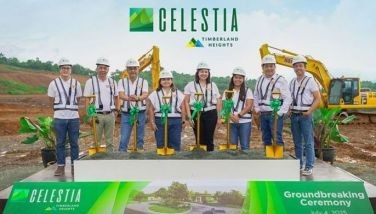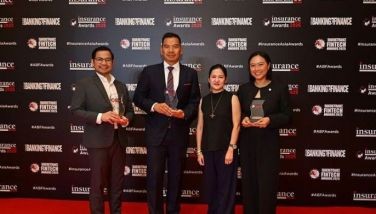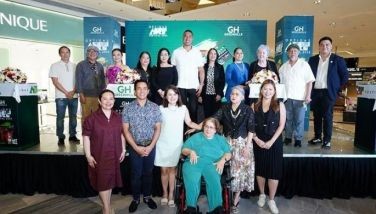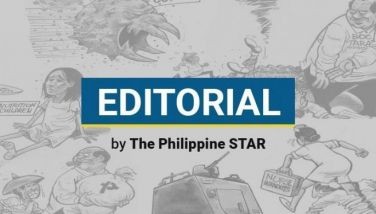Korean ambassador’s brainchild

February 10, 2004 | 12:00am
At the end of this month, Korean Ambassador to the Philippines Son Sang-Ha will be saying goodbye to his post, a little regretfully because he has a great admiration for Filipinos, but with a sense of fulfillment because his brainchild has just begun to be realized. This is the groundbreaking of the vocational training center facility in Davao City which he says is his country‚s contribution to the peace and development effort in Mindanao.
The ambassador assumed his Manila assignment in September, 2001. He religiously read the newspapers everyday to find out what was going on in the country. Then he read the reports about President Gloria Macapagal-Arroyo’s declaration against poverty. "She said poverty is the enemy of peace and order in the Philippines. If you don‚t get rid of poverty, you cannot have economic development particularly in Mindanao. She said peace and order was the centerpiece of her administration."
The President’s declaration touched him, the ambassador recalled. "I was deeply impressed by the President‚s insight, by her appeal to the people. I remembered that the Philippines went to our help in the Korean War. I thought as ambassador, I should react to the President’s campaign against poverty. I immediately recommended to my government that to help the Filipino people, we should put up a vocational training center in Mindanao. There is need for skilled labor and technology to improve industries in Mindanao."
The Korean government responded to the ambassador’s recommendation. Last Friday, groundbreaking ceremonies for a US$5-million training facility were held in Davao City. In a memorandum of agreement, the assistance would not be in the form of cash, but to the building of the facility and provision of software assistance for trainees for agricultural projects. The Philippine government would provide the land and the Technical, Educational, Scientific Development Authority (TESDA) do the actual training of the scholars.
The ambassador attended the groundbreaking ceremonies, and so did Mr. Kim Suk Hyun, president of the an Overseas International Cooperation Agency (KOICA).
There is more than just a training center in Davao. The ambassador says there is another grant from his government of US$5-million for an information-technology training center in Manila, but somehow the Philippine government has not come to a decision on the site of the facility.
The Korean government will continue assisting the reconstruction and development efforts in Mindanao, says Ambassador Son. It has committed itself to join the development fund promised by foreign investors for projects – as soon as a peace agreement is reached by the Philippine government and the Moro Islamic Liberation Front (MILF). Which is why he hopes the peace negotiations will be successful.
Ambassador Son attended Seoul National University for his college degree, majoring in German language and literature – for the simple reason that Germany was an idol of many young Koreans at that time. He joined the foreign service and his postings included Indonesia, Malaysia, Germany, Norway, Saudi Arabia, and just efore coming to Manila, the People’s Republic of Korea. His three-year term ends this month.
He has made several trips to Davao and Zamboanga, and his association with Filipinos has made him conclude that he likes the people of the Philippines, and he feels safe with them and is able to sleep very well at night. "The Filipinos are most globalized people, they are open-minded and kind and accessible. They have no bias, no discrimination. They are optimistic about the future, and are talented in the arts and other areas."
Korea which has a population of 47 million in an area three times bigger than the Philippines, is one of the economic tigers of Asia, and its rapid economic growth has been a model for still-developing countries like the Philippines.
Asked how this country can speed up its economic growth, the ambassador says, "Look to the East, look to the East." He says the role of leaders is crucial to development. There’s Malaysia‚s prime minister, Mohammad Mahathir. "He was a very strong leader, he adopted a Look East policy." He adds, "That means, look to Japan and Korea. Use the examples of the east."
He touches on the link between development and the quality of government leaders. "The Philippines has scanty resources, it has no money. You have to use these scanty resources effectively."
Strong leaders are often criticized for their dictatorial rule, but they may be needed to make great nations. In the case of former Korean President Park Chung Hee, he was "very honest, he was accused of being a dictator, but he did not pocket the people‚s money or stash it in Swiss banks. Instead he put the country’s resources into factories, chemical industries and steel mills."
The ambassador also points to China as a good model for development. "Look to China, how it made a successful story. China is not a democratic country, it’s still a socialist country, but it opened its market to competition and invited foreign investment. The bottom line is that there is one voice, studies are made and decisions on them do not take long but are quickly made."
The Koreans as a people contribute greatly to their country’s economic growth. The ambassador says, "Koreans are hard-working. Like myself, I can’t be idle, I have to be always doing something – writing, walking, golfing."
E-mail: dominimt2000@yahoo.com
The ambassador assumed his Manila assignment in September, 2001. He religiously read the newspapers everyday to find out what was going on in the country. Then he read the reports about President Gloria Macapagal-Arroyo’s declaration against poverty. "She said poverty is the enemy of peace and order in the Philippines. If you don‚t get rid of poverty, you cannot have economic development particularly in Mindanao. She said peace and order was the centerpiece of her administration."
The President’s declaration touched him, the ambassador recalled. "I was deeply impressed by the President‚s insight, by her appeal to the people. I remembered that the Philippines went to our help in the Korean War. I thought as ambassador, I should react to the President’s campaign against poverty. I immediately recommended to my government that to help the Filipino people, we should put up a vocational training center in Mindanao. There is need for skilled labor and technology to improve industries in Mindanao."
The Korean government responded to the ambassador’s recommendation. Last Friday, groundbreaking ceremonies for a US$5-million training facility were held in Davao City. In a memorandum of agreement, the assistance would not be in the form of cash, but to the building of the facility and provision of software assistance for trainees for agricultural projects. The Philippine government would provide the land and the Technical, Educational, Scientific Development Authority (TESDA) do the actual training of the scholars.
The ambassador attended the groundbreaking ceremonies, and so did Mr. Kim Suk Hyun, president of the an Overseas International Cooperation Agency (KOICA).
There is more than just a training center in Davao. The ambassador says there is another grant from his government of US$5-million for an information-technology training center in Manila, but somehow the Philippine government has not come to a decision on the site of the facility.
The Korean government will continue assisting the reconstruction and development efforts in Mindanao, says Ambassador Son. It has committed itself to join the development fund promised by foreign investors for projects – as soon as a peace agreement is reached by the Philippine government and the Moro Islamic Liberation Front (MILF). Which is why he hopes the peace negotiations will be successful.
Ambassador Son attended Seoul National University for his college degree, majoring in German language and literature – for the simple reason that Germany was an idol of many young Koreans at that time. He joined the foreign service and his postings included Indonesia, Malaysia, Germany, Norway, Saudi Arabia, and just efore coming to Manila, the People’s Republic of Korea. His three-year term ends this month.
He has made several trips to Davao and Zamboanga, and his association with Filipinos has made him conclude that he likes the people of the Philippines, and he feels safe with them and is able to sleep very well at night. "The Filipinos are most globalized people, they are open-minded and kind and accessible. They have no bias, no discrimination. They are optimistic about the future, and are talented in the arts and other areas."
Korea which has a population of 47 million in an area three times bigger than the Philippines, is one of the economic tigers of Asia, and its rapid economic growth has been a model for still-developing countries like the Philippines.
Asked how this country can speed up its economic growth, the ambassador says, "Look to the East, look to the East." He says the role of leaders is crucial to development. There’s Malaysia‚s prime minister, Mohammad Mahathir. "He was a very strong leader, he adopted a Look East policy." He adds, "That means, look to Japan and Korea. Use the examples of the east."
He touches on the link between development and the quality of government leaders. "The Philippines has scanty resources, it has no money. You have to use these scanty resources effectively."
Strong leaders are often criticized for their dictatorial rule, but they may be needed to make great nations. In the case of former Korean President Park Chung Hee, he was "very honest, he was accused of being a dictator, but he did not pocket the people‚s money or stash it in Swiss banks. Instead he put the country’s resources into factories, chemical industries and steel mills."
The ambassador also points to China as a good model for development. "Look to China, how it made a successful story. China is not a democratic country, it’s still a socialist country, but it opened its market to competition and invited foreign investment. The bottom line is that there is one voice, studies are made and decisions on them do not take long but are quickly made."
The Koreans as a people contribute greatly to their country’s economic growth. The ambassador says, "Koreans are hard-working. Like myself, I can’t be idle, I have to be always doing something – writing, walking, golfing."
BrandSpace Articles
<
>
- Latest
- Trending
Trending
Latest
Trending
Latest
Recommended

July 8, 2025 - 12:00am
























